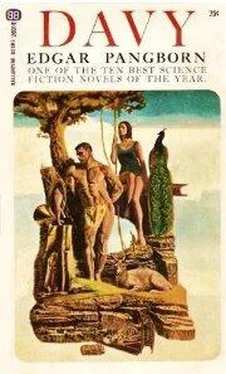We had known it would come; maybe we had all known it would find us, in our various ways, unready. The pilgrims were all aware of that face at the end of the street, I think, but their music did not falter. Vilet stopped singing, however; I saw Jed lift her hand gently away from his arm, and then he was moving a step or two down the long street. At that moment the tiger’s face dropped out of view.
“He’s gone,” ViJet said. “See, Jed — he’s gone, I tell you.” She must have known as we all did that the tiger had not gone. Jed did not look now like a man crazily determined to rush into danger. He was smiling, with some sort of pleasure. He had gone only a little way beyond the kneeling, singing pilgrims. Father Delune was praying silently, his old hands laced together below his chin; I think he was watching Jed, but did nothing to detain him.
Nor could I, nor Sam. We were all in a way paralyzed, alone, not hearing each other, watching the empty spot at the end of the street, the blind gray-brown of weathered logs and tropic green of forest beyond. Jed’s face was pouring sweat as it had done the day before on the road. A tremor shook his hands and legs as if the earth were vibrating under him, yet he was going on, slowly, as one sometimes journeys in the sorrowful or terrifying or seeming-ludicrous adventures of a dream.
The tiger soared in an arc like the flight of an arrow, over the gate and into the village.
The tiger paused for a second, his eyes surveying, calculating lines of attack and retreat, measuring with a cat’s wonderful swift cleverness. Jed made no pause but walked on clumsy and brave, disregarding or not hearing the two priests who now called after him in horror to come back. Jed was holding his arms spread wide, as Father Delune had done when praying at the front gate, but Jed seemed more like a man groping for direction in the dark.
The tiger ran flowingly toward us along the hot street, not in a charge at first, but a rapid trotting run with head high, like a kitten advancing in sheer play, mimic attack. I suppose he could not have expected to see a human being walk toward him with those queer forbidding outspread arms. He rose on his hind legs in front of Ted and tapped at him with one paw. The motion seemed light, playful, downright absurd. It sent Jed’s massive body twisting and plunging across the street to crash against the gatepost of a house and lie there at the foot of it disembowelled, in a gush of blood.
The tiger did charge then, a tearing rush so swift that there was time to hear a woman scream only once; then I saw the green fire of his eyes blazing full on us while his teeth fumbled an instant and closed in Jerry’s back. Jerry’s mother screamed again and lunged at the beast with little helpless hands. A swing of his head evaded her without effort. He was trotting off down the street the way he had come, head high again, Jerry’s body in his jaws seeming no bigger than a sparrow’s. He was over the gate and into the wilderness, the woman silent but tearing her pilgrim’s gown to slash at her breasts and then beat her fists in the dust of the road.
I had snatched one of the arrows from Sam’s hand. I remember having it on the string when the tiger was running away down the street, and a black thing crashing against me which was Father Delune snatching my ann so that the arrow flew useless over the rooftops. He may have been right to do it.
Moments later Sam and Father Fay and I were with Vilet, who was fumbling at fed’s body as if there were some way she could make it live. “Mam Sever,” Father Fay said, and shook her shoulder, and glanced back at the other woman who needed him — but Father Delune and the older pilgrim women were helping Jerry’s mother into the church. “Mam Sever, you must think of yourself.”
She crouched on her heels glaring up at us. “You could’ve stopped him, the lot of you. You, Davy, I told you to stop him! Oh, what am I saying?”
“Likely we are all to blame,” said Father Fay. “But come away now. Let me talk to you.”
Sam’s hand on my shoulder was taking me away too. We were in some partly enclosed place, the doorway of a shop I think, and Sam was talking to me, bewildering me more than ever, for it was something about Skoar. He shook me to get me out of my daze. “Davy, will you listen once? I’m saying it was just near-about fifteen years past, and one of them so’t of average places—”
“You said ‘Davy.’ ”
“Ayah, one of them medium places, not fancy but I mean, not so bad neither, can’t fetch back the name of the street — Grain — no—”
Part of me must have been understanding him, for I know I said: “Mill Street?”
“Why, that was it. A redhead, sweet and — nice, someway, nothing like them beat-up—”
“So God damn you, you flang her a little something for your piece and walked out, that what you mean?”
“Davy, a man at such a place — I mean, you don’t anyhow get acquainted before you’re obliged to go, nor the girl she don’t want to know you, come to that. And still and all, maybe you get to know as much as you do in some marriages, I wouldn’t wonder.” He would not either let go my shoulders or look at me, only staring over my head, waiting for me. “I been married — still am, come to that. Wife down Katskil way that damn-nigh talked me to death. But the little redhead at that Skoar place-I mean, half an hour of one night and then it’s ‘On your way, fella!’ — and me with never a notion I could’ve left a package behind. Which maybe I didn’t, Davy, we wouldn’t ever know for sure. But I was thinking, I’d like for it to be so.”
“I dunno why I spoke to you like that.”
“Still sore?”
“No.” I have never cried since that morning, but I’m inclined to think that, once in a great while, tears are useful to the young. “No. I a’n’t sore.”
“So supposing I am your Da — is it all right?”
“Yes.”
The January rains fall more steadily here on the island Neonarcheos than any we remember. For two weeks we have been unable to work at clearing new ground. Nickie is uncomfortable in pregnancy and so is Dion — I mean that like me he is trying to give birth to a book, setting down what he can recall of the history of Nuin before it fades or becomes distorted in his mind. We do have paper now: the brookside reeds yield a course product to our primitive methods that takes our lamp-black ink reasonably well.
From lamp-black my mind jumps to lamps and lamp-oil. When the casks of seal oil we brought in the Morning Star have been exhausted we’ll have no more. We can worry away at native vegetable oils and waxes, and when our sheep have increased there will be tallow to renew the sup.ply of candles. Lambing time in a couple of months wifi be a major event. Of course, Nickie and I seldom object to going to bed early.
Lamps, candles, animal husbandry — we have enough problems on that level to keep our people busy a hundred years, if there’s that much time. There may not be. We needn’t suppose that because we were the first in centuries to sail the great sea, our enemies won’t follow — soon, perhaps. They have as much courage of the simple kind as we have, or they couldn’t have won the war of the rebellion in spite of their superior numbers. True, it called for the imagination of Sir Andrew Barr, the knowledge in old books forbidden, the orders and protection of Dion as Regent of the richest and strongest of the nations, and the labor of many hands, to create the schooner Hawk and later the Morning Star. Salter’s victorious army had no such vessels to send in pursuit of us, no men capable of handling them. However, given the spark, they might build something capable of venturing out, if the Church would relax her prohibitions.
Читать дальше












